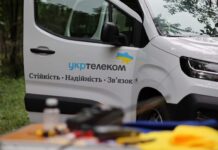Vodafone‘s investments in the network in Ukraine increased by 75% compared to last year. This year, the company invested about UAH 150 million in the resilience of its mobile network and a total of UAH 245 million in the resilience of its fixed network, and this figure is constantly growing.
This was reported to HiTech Expert by the company’s press service.
Preparing the network
The operator has been preparing the grid for new possible blackouts since last winter and throughout the summer. New high-capacity lithium-ion batteries were purchased to create a sufficient reserve of electricity at each technical site. These batteries are more adapted to harsh operating conditions, have a higher capacity, are less sensitive to frequent power outages, and have a 2.5-3 times faster charging speed compared to the batteries used previously.
As of today, more than 9,000 new batteries (partly batteries with increased capacity and partly lithium batteries) have been installed at 2,255 sites. This is an additional reserve capacity of 685,800 ampere-hours.
The company has almost 4 times increased the number of base stations that will be powered by diesel generators.
“Last fall and winter, the lowest daily service availability rate at base stations was ~84%. These were the worst periods, which lasted only a few days in total for the entire period,” the statement said. – “Given the increased activity in preparing the network, and the same situation in the energy sector (rolling blackouts of up to 4 hours with 6-hour breaks), we should stay within 85-90% of the average daily network availability.
Mobile force majeure
The operation of a mobile network in conditions of unstable power supply is also a force majeure for the operator. After all, the operation of base stations directly depends on power supply.
“Yes, we equip all our communication facilities with backup power, but the batteries also have their own capacity and take a long time to recharge. In the event of repeated power outages during the day, they simply do not have time to recharge,” Vodafone said.
Obviously, it is impossible to provide all sites with diesel generator sets (DGS) – there are hundreds of them in each region. Even if a sufficient number of generators are available, no operator can simultaneously deliver a diesel generator set to each site and refuel it in time. In addition, many communication facilities are located on rooftops, where it is impossible to deliver and install a generator.

Involvement of partners
Vodafone is also actively engaging partners in the joint use of stationary DGS, which is a painstakingly detailed work that allows us to increase the coverage map in case of outages and improve the availability of services. And we have already gained experience of cooperation with both local authorities and local businesses.
The company is open to further cooperation – if anyone has a diesel generator set with a capacity of 2 to 5 kW, which you are ready to share to provide communication for your company and other subscribers within the range of the base station, the company will be grateful to receive a message at no_blackout@vodafone.ua – Vodafone experts will be happy to discuss the details of possible cooperation.
Network load
The quality of communication is also affected by the load on the network – when the power goes out, all residents switch from home Internet to mobile Internet en masse. The network experiences an avalanche-like increase in load, which leads to a slowdown in the speed of each consumer and a faster discharge of the base station’s batteries.
“So we advise you to check whether your fixed Internet provider provides fixed Internet access even during power outages. Vodafone provides access to the Vodafone Gigabit Net fixed Internet using GPON technology,” the press service said.
The company’s networks are fully equipped with rechargeable batteries that can provide power for up to 24 hours. The operator has ready-made scenarios for connecting generators to ensure uninterrupted operation of Internet services in accordance with the decisions of the central government authorities – 72 hours or more. Users only need to take care of power banks for their router and user device.








